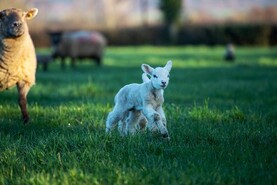Farmers will have welcomed rain over the weekend, and with temperatures set to rise this week grass growth will be on the rise.
But so too, will the level of worms on grazing ground. Warm and humid conditions are ideal for the rapid multiplication of gut and lungworms, so herd owners need to be alert to cattle health.
Spring-born calves have no immunity to worms and will be most at risk. As these animals are taking in more grazed grass on a daily basis, calves can ingest large numbers of parasites in a short period.
Autumn weanlings and store cattle will also be at risk, so step in with a suitable wormer to control the burden as necessary.
When choosing a wormer, discuss the options with your vet. Some wormers offer a rapid kill of lungworms, which put calves under respiratory pressure as the animal tries to expel dead worms by coughing.
This can cause mortality in young animals. In some cases, cattle can continue to cough for a week to 10 days after dosing.
In such cases, cattle are usually coughing up dead worms, so don’t assume the wormer was ineffective and go in with a second treatment.
Read more
Preparing for a burst in grass growth on beef farms
Watch: onto ‘Plan B’ with the beef cattle
Farmers will have welcomed rain over the weekend, and with temperatures set to rise this week grass growth will be on the rise.
But so too, will the level of worms on grazing ground. Warm and humid conditions are ideal for the rapid multiplication of gut and lungworms, so herd owners need to be alert to cattle health.
Spring-born calves have no immunity to worms and will be most at risk. As these animals are taking in more grazed grass on a daily basis, calves can ingest large numbers of parasites in a short period.
Autumn weanlings and store cattle will also be at risk, so step in with a suitable wormer to control the burden as necessary.
When choosing a wormer, discuss the options with your vet. Some wormers offer a rapid kill of lungworms, which put calves under respiratory pressure as the animal tries to expel dead worms by coughing.
This can cause mortality in young animals. In some cases, cattle can continue to cough for a week to 10 days after dosing.
In such cases, cattle are usually coughing up dead worms, so don’t assume the wormer was ineffective and go in with a second treatment.
Read more
Preparing for a burst in grass growth on beef farms
Watch: onto ‘Plan B’ with the beef cattle






 This is a subscriber-only article
This is a subscriber-only article









SHARING OPTIONS: